15+ Questionnaire Examples to Download
A questionnaire is a structured tool used to gather information from individuals by asking a series of pre-defined questions. It is commonly employed in research, surveys, and assessments to collect data on opinions, behaviors, or experiences. Questionnaires can include various types of questions, such as multiple-choice, Likert scale, or open-ended, allowing for both quantitative and qualitative analysis. They are an efficient way to reach large groups of people, providing standardized responses that can be easily analyzed to inform decisions or understand trends.
What is a Questionnaire?
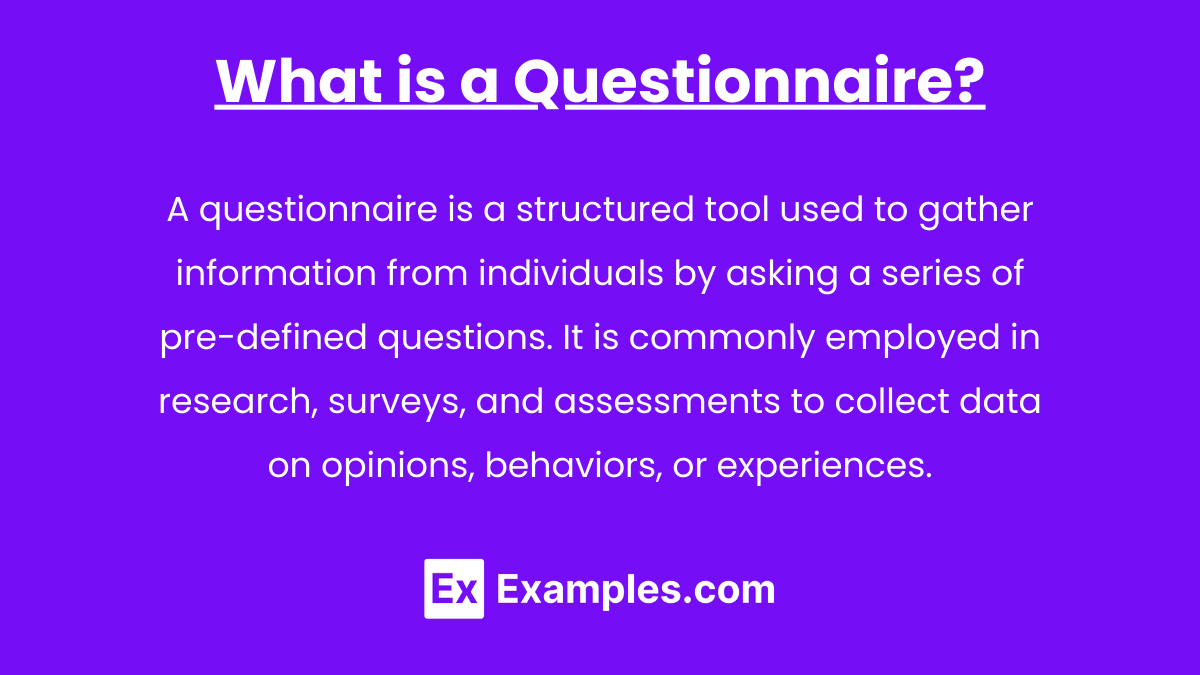
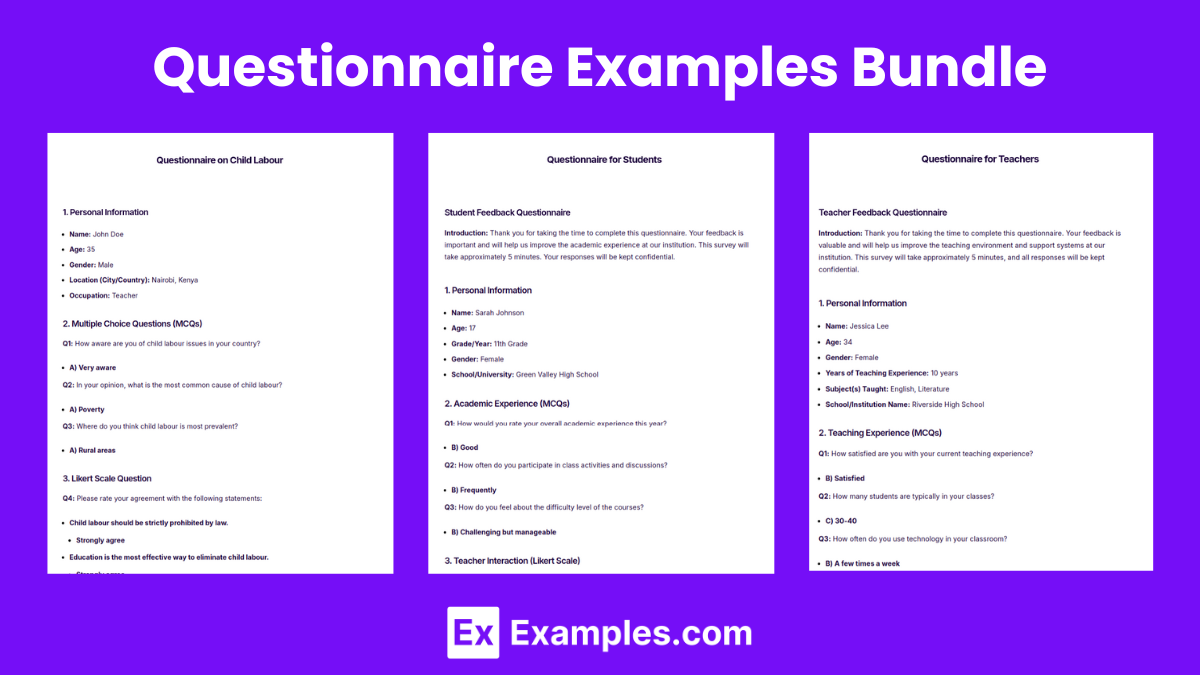
Download Questionnaire Examples Bundle
Questionnaire Format
Title of the Questionnaire
Clearly state the purpose (e.g., Student Satisfaction Survey, Customer Feedback Questionnaire, etc.).
Introduction
Provide a brief introduction explaining the purpose of the questionnaire and how the data will be used. Mention the approximate time required and ensure confidentiality if applicable.
Personal Information (Optional)
This section gathers basic demographic information:
- Name
- Age
- Gender
- Location
- Occupation/Student Level
Section 1: General Information
Provide simple, straightforward questions.
Q1: How often do you use our service?
- A) Daily
- B) Weekly
- C) Occasionally
- D) Never
Section 2: Multiple Choice Questions (MCQs)
Use questions that have predefined answers for respondents to choose from.
Q2: How would you rate your overall experience?
- A) Excellent
- B) Good
- C) Fair
- D) Poor
Section 3: Likert Scale Questions
Measure the respondent’s opinion on a scale.
Q3: Rate your agreement with the statement: “I am satisfied with the course content.”
- Strongly agree
- Agree
- Neutral
- Disagree
- Strongly disagree
Section 4: Open-Ended Questions
Allow respondents to provide detailed feedback in their own words.
Q4: What could we improve in our services?
Section 5: Ranking Questions
Ask participants to rank items by preference.
Q5: Rank the following areas in order of importance for improving student success (1 = most important, 4 = least important):
- Curriculum
- Teaching Quality
- Support Services
- Extracurricular Activities
Closing Remarks
Thank the respondents for their participation and remind them how their input will help improve the service, research, or program
Questionnaire Example
Online Course Feedback Questionnaire
Personal Information (Optional)
- Name: Sarah Thompson
- Age: 24
- Gender: Female
- Course Name: Introduction to Digital Marketing.
Multiple Choice Questions (MCQs)
Q1: How satisfied are you with the overall quality of the online course?
- B) Satisfied
Q2: How often did you access the course materials?
- A) Daily
Q3: How would you rate the interaction with the instructor during the course?
- B) Good
Likert Scale Questions
Q4: Please rate your agreement with the following statements:
The course content was well-organized.
- Agree
I was able to understand the topics clearly.
- Strongly Agree
Technical support was helpful when needed.
- Neutral
Open-Ended Questions
Q5: What did you like the most about the online course?
- I really appreciated the flexibility of the course schedule. The content was engaging and easy to follow, especially the video lectures.
Q6: What areas of the course could be improved?
- The course could benefit from more interactive elements, like quizzes after each module to reinforce learning. Additionally, more real-life examples would help connect the theory to practice.
Ranking Questions
Q7: Rank the following elements of the course in terms of importance to you (1 = most important, 4 = least important):
- 1) Course Content
- 2) Flexibility of Schedule
- 3) Instructor Support
- 4) Access to Course Materials
Closing Remarks
Thank you for your valuable feedback! Your responses will help us enhance future online courses.
Questionnaire on Child Labour
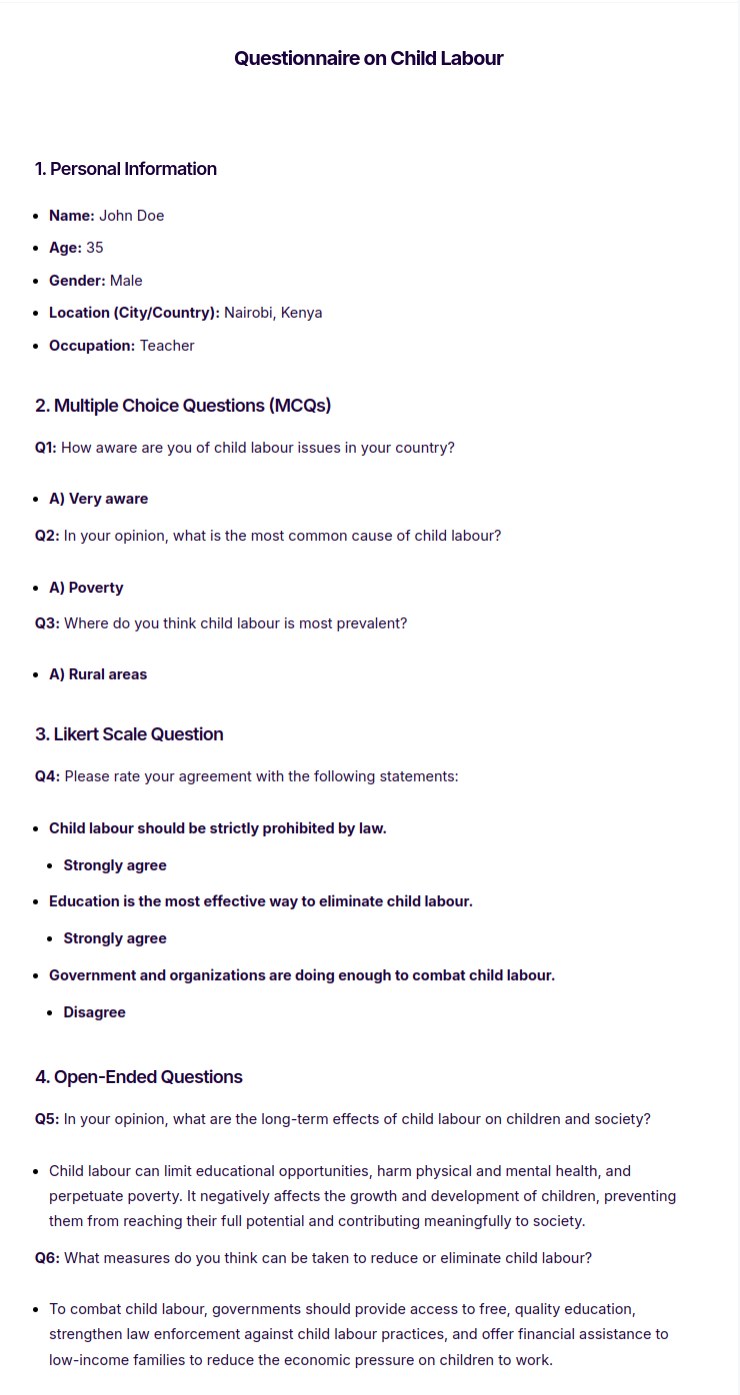
Questionnaire for Students
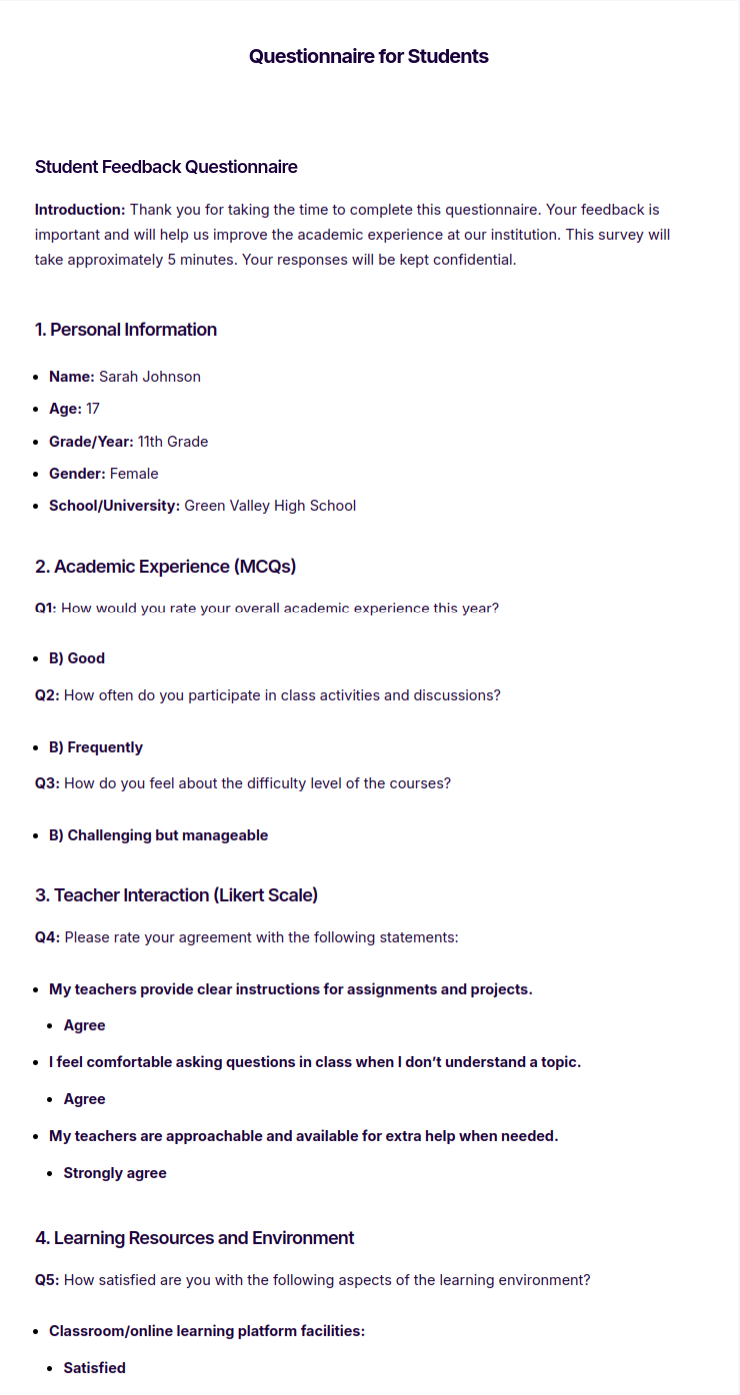
Questionnaire for Teachers
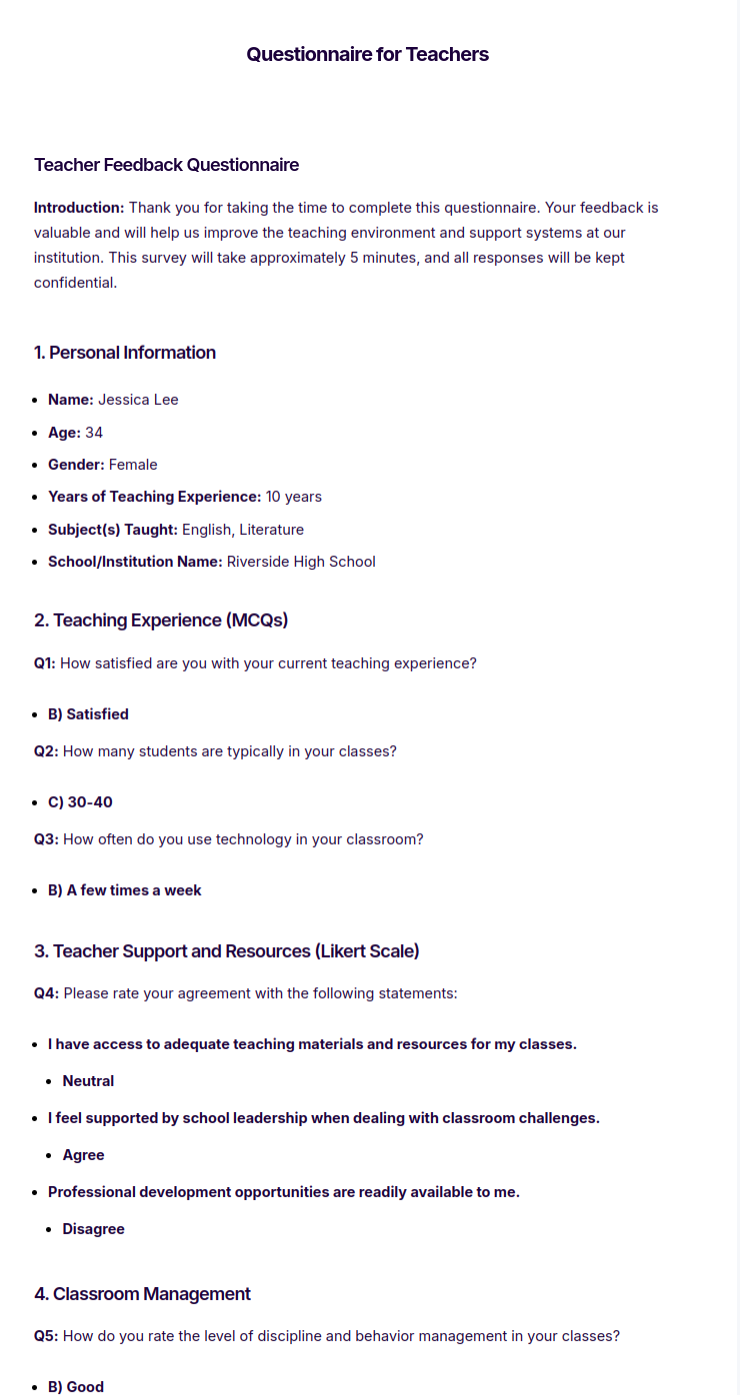
More Questionnaire Examples and samples
- Couples Relationship Questionnaire
- Questionnaire for friends
- Questionnaire for kids
- Questionnaire for boyfriend
- Questionnaire in psychology
- Questionnaire on depression
- Questionnaire on health care facilities
- Questionnaire on artificial intelligence in education
- Questionnaire in research
Interview Questionnaire Template
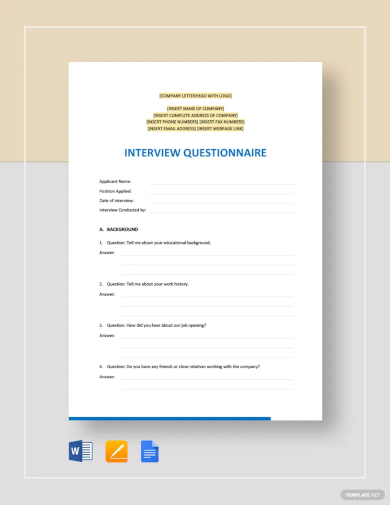
Student Questionnaire Template Example
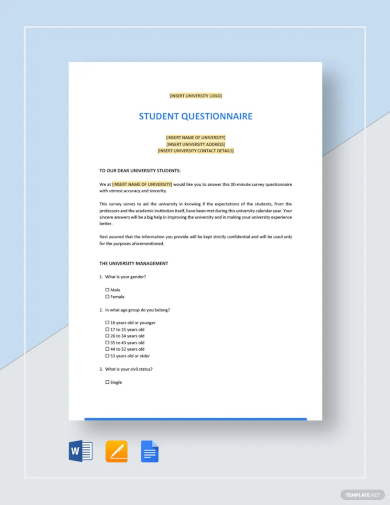
Job Interview Questionnaire Template
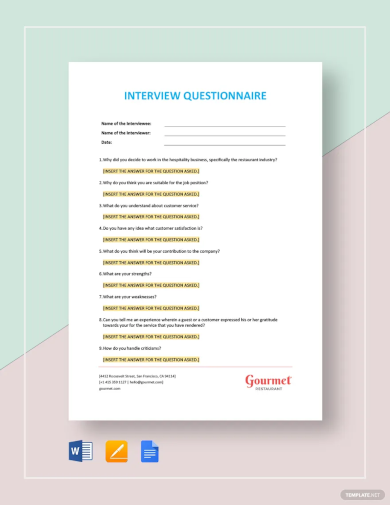
Wedding Planner Client Questionnaire
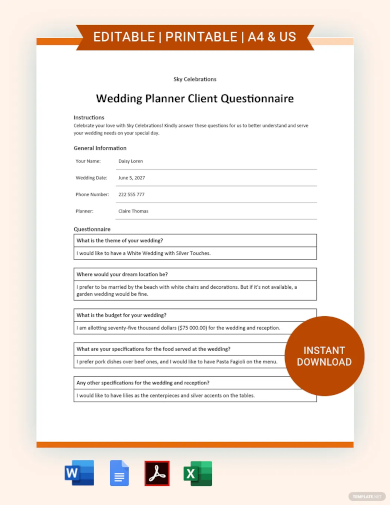
Client Exit Questionnaire Example
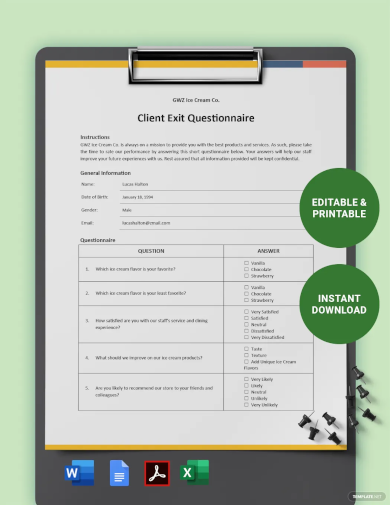
Investment Risk Assessment Questionnaire
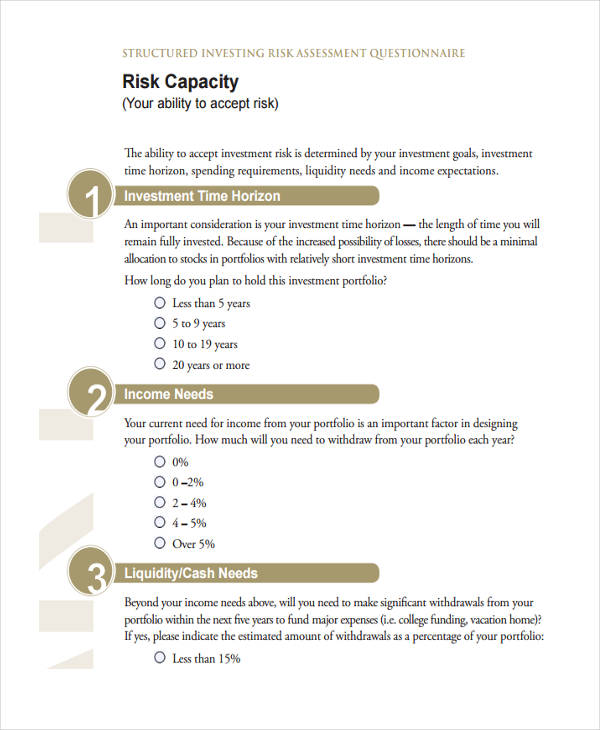
Security Risk Assessment Questionnaire
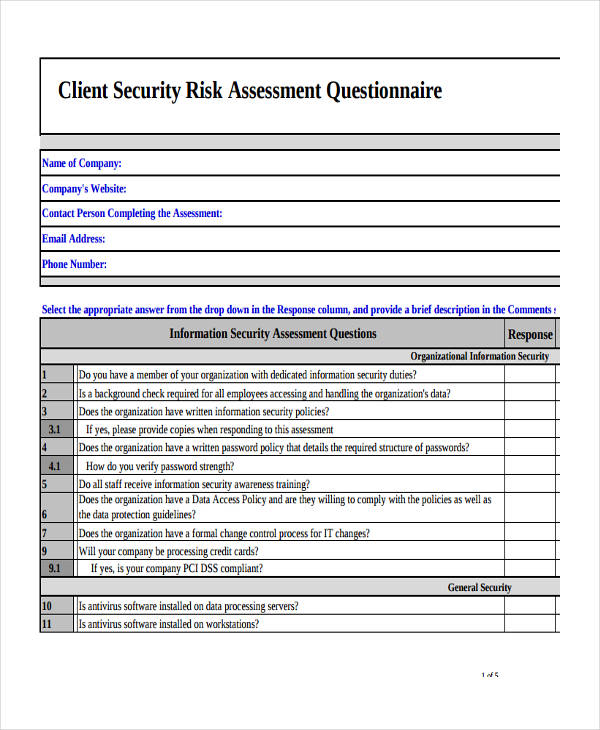
What is the Purpose of a Questionnaire?
Questionnaires, more often than not, have the first and foremost intention of uncovering answers. They are further useful in the following:
- Awareness – Individuals perceive a commodity or issue in different ways. Understanding how people accept or see a product or issue helps in getting a clear picture about it and may be able to compensate from the results and improve on the issues preventing individuals from accepting that product or issue. Sales and marketing teams usually conduct such surveys to determine what the consumers or customers are actually saying about the products they are offering in order for them to correct and address issues uncovered during the said survey.
- Discernment of experiences – There are questionnaires made in order to acquire truthful recollections of individual experience relating to a product or service. Such questionnaires help narrow down issues concerning the product or service. Health questionnaire examples shown in the page have this goal in assessing public health safety and concerns.
- Evaluating sentiments – Certain questionnaires were made to measure sentiments of subject population in relation to an issue or perhaps a political persona. These questionnaires are quite useful in measuring the chances of, say for example, a political candidate to win in a certain state where a survey questionnaire example may be used.
Characteristics of a Good Questionnaire
A good questionnaire should have certain key characteristics to ensure it collects reliable and meaningful data. Here are the main characteristics of a good questionnaire:
- Clarity and Simplicity : Questions should be easy to understand, using simple and clear language. Avoid jargon or technical terms that could confuse respondents.
- Relevance : Each question should be directly related to the purpose of the questionnaire. Unnecessary or irrelevant questions should be avoided to respect the respondent’s time.
- Brevity : The questionnaire should be concise, asking only essential questions. Keep it short to prevent respondent fatigue and improve the response rate.
- Logical Flow : Questions should follow a logical sequence, moving from general to specific topics. Group similar questions together to create a natural flow.
- Neutral Wording : Questions should be unbiased and not lead respondents toward a particular answer. Avoid leading or loaded questions that could influence responses.
- Questionnaire vs survey
Types of Questionnaires
There are several types of questionnaires, each designed to collect specific types of data and used in various research contexts. Here are the most common types:
- Structured Questionnaire : Contains closed-ended questions with predefined answer options (e.g., multiple-choice, true/false, Likert scale).
- Unstructured Questionnaire : Includes open-ended questions where respondents can answer freely, providing qualitative insights.
- Semi-Structured Questionnaire : Combines both closed-ended (structured) and open-ended (unstructured) questions.
- Self-Administered Questionnaire : The respondent completes the questionnaire on their own without an interviewer.To collect data efficiently from large groups, often used for online surveys or mail-in forms.
- Interviewer-Administered Questionnaire : A researcher or interviewer asks the questions and records the responses.
- Multiple-Choice Questionnaire : A questionnaire that asks respondents to choose from predefined answer choices.
- Open-Ended Questionnaire : Consists solely of open-ended questions that allow respondents to answer in their own words.
- Close-Ended Questionnaire : Contains questions where respondents must choose from limited options, such as yes/no or predefined categories.
How to Design a Questionnaire?
- Define the Objective
- Clarify the purpose of your questionnaire and what data you need to collect.
- Example: To measure customer satisfaction, you’ll focus on service quality, product performance, etc.
- Identify Your Target Audience
- Determine who will complete the questionnaire (e.g., students, employees, customers).
- Tailor language and question complexity to your audience’s level.
- Choose the Question Types
- Closed-ended questions: Multiple choice, yes/no, Likert scale for quantitative data.
- Open-ended questions: For qualitative, in-depth insights.
- Rating/Ranking questions: For preferences or evaluations.
- Ensure Clarity and Simplicity
- Use clear, simple language that is easy to understand.
- Avoid jargon, technical terms, or complex wording.
- Use a Logical Flow
- Organize questions in a logical order, starting with general questions and moving to specifics.
- Group similar questions together to maintain consistency.
- Avoid Leading or Biased Questions
- Keep questions neutral to avoid influencing respondents’ answers.
- Example: Instead of “Is our service excellent?” ask “How would you rate our service?”
- Limit the Number of Questions
- Keep the questionnaire short and to the point to avoid respondent fatigue.
- Focus on essential questions that align with your objective.
- Pilot Test the Questionnaire
- Test your questionnaire on a small sample before full distribution.
- Collect feedback to improve clarity, structure, or question phrasing.
- Provide Clear Instructions
- Include instructions to guide respondents on how to answer the questions.
- Example: “Select one answer that best represents your experience.”
- Offer Anonymity and Confidentiality (if needed)
- Ensure privacy and confidentiality, especially if dealing with sensitive topics.
- This increases the honesty and accuracy of responses.
- Use Proper Formatting
- Ensure the questionnaire is visually appealing and easy to navigate.
- Use bullet points, proper spacing, and consistent fonts for a user-friendly design.
- Analyze the Data
- Plan for data analysis when designing the questionnaire.
- Include questions that provide easy-to-analyze data, such as closed-ended questions for statistics and open-ended for qualitative analysis.
Advantages and disadvantages of using a questionnaire
| Advantages of Using a Questionnaire | Disadvantages of Using a Questionnaire |
|---|---|
| Cost-Effective: Inexpensive way to gather data from a large audience. | Limited Depth: Responses can lack detail, leading to superficial data. |
| Time-Efficient: Respondents can complete at their convenience, and data collection is quick. | Low Response Rate: Many may ignore or abandon questionnaires, affecting reliability. |
| Standardization: All respondents receive the same questions, ensuring consistency. | Misinterpretation: Respondents may misunderstand questions without clarification. |
| Anonymity: Encourages honesty, especially for sensitive topics, by allowing anonymous responses. | Fixed Responses: Closed-ended questions may limit answers, not capturing full opinions. |
FAQ’s
When should a questionnaire be used in research?
A questionnaire should be used when researchers need to gather data from a large audience quickly and at a low cost. It is particularly effective when uniform responses are required across all participants, such as in large-scale surveys, market research, or social science studies. Questionnaires are also ideal for gathering quantifiable data, which can be easily analyzed. However, they may not be suitable for research that requires in-depth responses or personal interaction.
How can researchers improve response rates for questionnaires?
To improve response rates, researchers should keep the questionnaire short and to the point, ensuring it is easy to complete. Offering incentives, such as discounts or entry into a prize draw, can motivate participation. Additionally, ensuring anonymity can make respondents feel more comfortable answering honestly. Sending reminders to participants and creating an engaging design for online questionnaires can also increase completion rates.
How should a questionnaire be structured?
A well-structured questionnaire starts with a clear and concise introduction explaining the purpose of the survey and assuring confidentiality. It’s important to group similar questions together and ensure they flow logically from general to specific topics. Begin with easy, engaging questions to build interest, followed by more complex or sensitive questions in the middle. The questionnaire should end with open-ended or optional questions that allow respondents to share additional feedback. Clarity and brevity are essential to avoid overwhelming respondents.
How are questionnaires distributed?
Questionnaires can be distributed in various ways depending on the target audience and research scope. Paper-based questionnaires are still used in places with limited internet access or for face-to-face surveys. However, online questionnaires have become increasingly popular due to their wide reach, convenience, and cost-effectiveness. These can be distributed via email, social media, or survey platforms like Google Forms or SurveyMonkey. In some cases, telephone surveys or face-to-face interviews use questionnaires as a guide for collecting responses verbally.
How can questionnaires be analyzed?
Analysis of questionnaires depends on the type of questions used. For closed-ended questions, the data can be easily quantified and analyzed using statistical tools or software like Excel or SPSS. Responses can be presented in graphs, tables, or percentages to summarize the findings. For open-ended questions, qualitative analysis methods are used, where themes or patterns in the responses are identified. This is more time-consuming but provides deeper insights into respondents’ thoughts and feelings.


